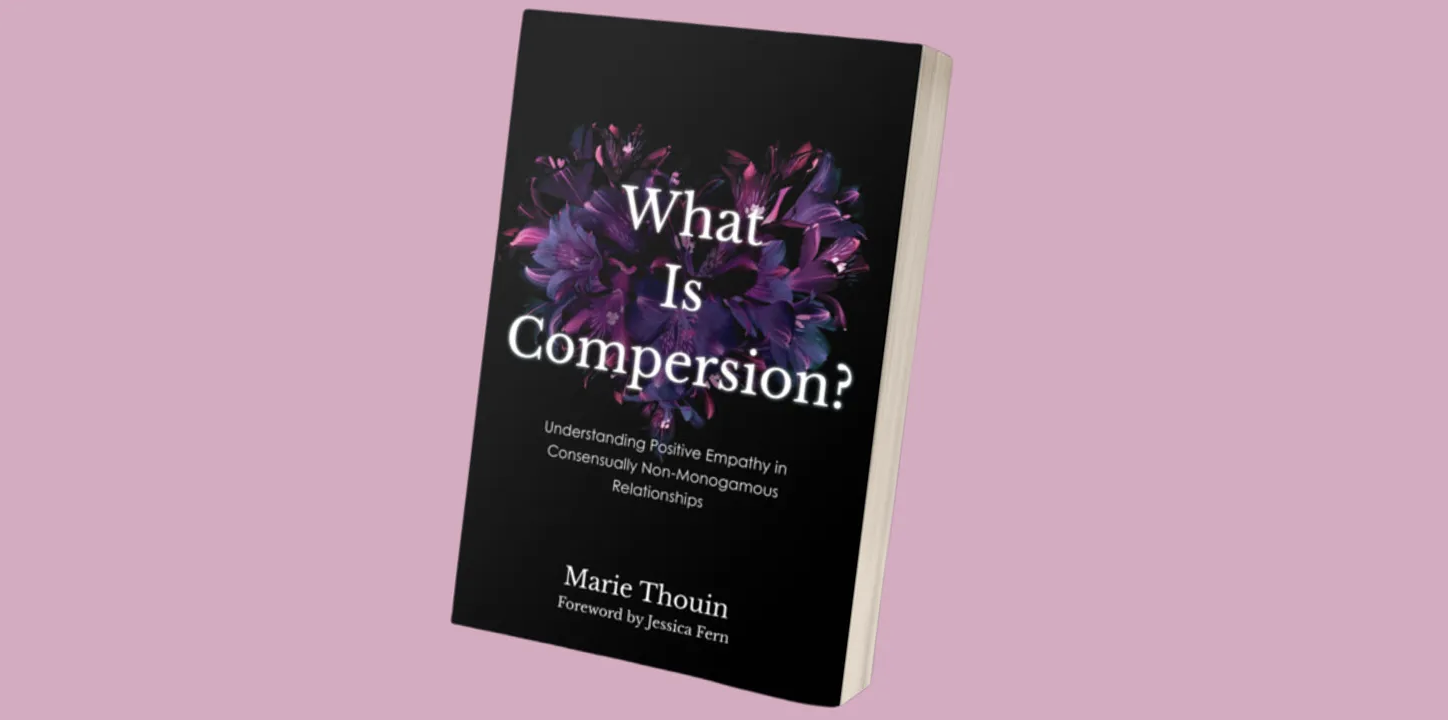Jealousy and Compersion on Love Island
When I watch Love Island, I’m less interested in who ends up together than in what happens emotionally along the way. The show is packed with jealousy, comparison, and sexual possessiveness—but also, occasionally, with moments of surprising care. People feel threatened, name it, and sometimes still choose to support someone they’re afraid of losing. This piece explores why reality dating shows revolve around jealousy, how they unexpectedly highlight compersion, and what these moments reveal about the sociology of sex.
Before You Even THINK About Compersion, Read This…
By Kathy Labriola, Marie Thouin, & Aria Diana
In this blog, Marie Thouin, Kathy Labriola, and Aria Diana offer a compassionate reframing of compersion by tracing the emotional journey before joy is even possible. Instead of treating compersion as a moral benchmark, they illuminate the often-hidden stages people move through—from crisis, fear, and overwhelm to neutrality, acceptance, and (sometimes) embodied joy. Drawing from coaching, research, and lived experience, they challenge the pressure to “feel good” and instead honor the courage it takes to simply stabilize in non-monogamy. This piece previews their collaborative zine Cultivating Compersion: Moving from Jealousy to Joy in Nonmonogamy (Microcosm Publishing), a warm and realistic guide for partners and metamours seeking growth at a humane pace.
Compersion and Omnipartiality in Mediation: Moving Past Win–Lose
by Marie Thouin, PhD
What if conflict didn’t have to be win–lose? In this post, I explore how concepts from the fields of relationship coaching and mediation can inform and enrich one another. In particular, I focus on two principles: compersion—finding joy in another’s flourishing—and omnipartiality—caring equally for everyone involved. Both can transform zero-sum assumptions and associated bottlenecks into opportunities for win–win outcomes. From family inheritance disagreements to high-conflict romantic relationships, these principles show how recognizing shared goals and valuing others’ wellbeing can generate solutions that benefit everyone.
When Saying No Comes From Love: A Story of Compersion in Action
By Aria Diana
In this story, relationship coach Aria Diana reflects on saying no to a shared vacation with her husband and metamour—not out of fear or distance, but from a place of deep trust and self-awareness. Rather than seeing her choice as a loss, she experienced it as an act of love—a way to create space for their connection while honoring her own needs. For Aria, compersion isn’t about erasing discomfort; it’s about staying grounded, attuned, and willing to let love expand beyond proximity. This moment of intentional distance became a powerful affirmation: love doesn’t have to travel the same path to remain deeply felt.
Self-Compersion: A Radical Act of Celebration, Compassion and Healing
By Molly Reagh, MSW
At Marie’s book launch for What is Compersion, relationship coach Molly Reagh was inspired by a simple yet profound idea: what if the joy we feel for others—the essence of compersion—could be turned inward? That question led Molly to explore the concept of self-compersion: the practice of actively celebrating oneself with tenderness, joy, and compassion. For Molly, self-compersion is more than self-acceptance—it’s a radical act of honoring personal growth, holding space for imperfection, and reinforcing self-trust. By offering herself the same empathy and delight she offers others, Molly found a path to deeper healing, resilience, and love—one that begins within.
Learning Compersion: Teaching Empathic Joy to Kindergartners
By Ari Wassmann
This blog explores the concept of compersion—finding joy in others' happiness—through the lens of a kindergarten classroom. The author, a teacher, notices how children struggle with jealousy when peers are chosen for special roles, like line leader. Determined to shift this mindset, they introduce compersion as the opposite of jealousy, designing an engaging lesson to help young students recognize and practice it. Through art projects and classroom activities, the kids begin learning to celebrate each other's successes. The blog highlights the power of teaching empathy and shared joy from a young age.
Compersion in Everyday Life: Finding Empathic Joy Beyond Polyamory
By Gwendolyn Watson, LMFT
This blog dives into the transformative power of compersion—the radical joy of seeing someone thrive, even when it doesn’t directly benefit you. While the concept is usually tied to polyamory, the author flips the script, showing how compersion can enrich any relationship, from monogamous partnerships to parenting. Through raw and revealing personal stories—battling jealousy over a partner’s obsession with learning French, confronting competitive instincts at a child’s basketball game, and discovering unexpected happiness in an ex-husband’s new love—the author exposes how a scarcity mindset holds us back. Compersion isn’t just a polyamorous ideal—it’s an invitation to experience love, connection, and abundance on a whole new level.
From Emotion to Orientation: Expanding Our Understanding of Compersion
By Shaun Miller, PhD
In this blog, philosopher Shaun Miller explores compersion not just as an emotional response in non-monogamous relationships, but as a fundamental orientation to human connection. He reframes compersion as a way of being—one rooted in deep caring, collaboration, and mutual flourishing. The blog also challenges the notion that jealousy is compersion’s opposite, suggesting instead that misanthropy—a withdrawal from human connection—stands in contrast. Ultimately, Miller argues that cultivating a compersive orientation is not just about overcoming jealousy but about embracing a radical openness to others’ joy, transforming not only relationships but our very understanding of what it means to be human.
Is Tolyamory Just Polyamory Without Compersion?
By Marie Thouin, PhD
Tolyamory—a blend of "tolerate" and "polyamory"—is a term newly coined by sex advice columnist and podcaster Dan Savage to describe a relationship dynamic in which one or both partners of an ostensibly monogamous couple turn a blind eye to their partner’s extramarital sexual activity.
How does it show up? Is it ethical? What does it have to do with compersion? Let’s categorize different types of tolyamory and explore whether it can ever qualify as a form of ENM (ethical non-monogamy).
Demystifying Compersion: Insights from Marie Thouin’s Groundbreaking New Book
By Aria Diana
Recently, I had the pleasure of speaking with Dr. Marie Thouin, a leading scholar on compersion and the author of the groundbreaking book, What is Compersion? Understanding Positive Empathy in Consensually Non-Monogamous Relationships. Our Instagram Live conversation focused on demystifying compersion and exploring how individuals practicing consensual non-monogamy (CNM) can cultivate this often misunderstood emotion.
Jessica Fern's Foreword to What Is Compersion?
By Jessica Fern, LMFT
This is the foreword to Marie Thouin’s forthcoming book, What Is Compersion? Understanding Positive Empathy in Consensually Non-Monogamous Relationships. Jessica Fern is a Psychotherapist, Coach, and Certified Clinical Trauma Professional. Jessica is the author of Polysecure: Attachment, Trauma, and NonMonogamy, The Polysecure Workbook, and Polywise: A Deeper Dive Into Navigating Open Relationships.
Following Hatred Into Compersion: Non-Monogamy and Mudita
By Dedeker Winston
After emerging from a silent meditation retreat, Dedeker initially believes she has achieved a state of enlightened compersion—the ability to feel joy for her partners' happiness in non-monogamy. However, reality quickly tests this newfound clarity. One partner embarks on an adventure with a metamour who despises them, while another falls in love with a stripper and decides to marry monogamously. The author grapples with jealousy, resentment, and the cultural resistance to compersion, ultimately realizing that true sympathetic joy cannot be forced. Through time, self-reflection, and reconciliation, they discover that compersion is not about suppressing difficult emotions but about healing and allowing joy to arise naturally.
Compersion as Resistance
By Evita “LaVitaLoca” Sawyers
For many non-monogamous folks, their participation in non-monogamy is a form of resisting ideas about love and relationships that were imposed upon us by oppressive social systems. And not only do they reject the notions of how we “should” be in relationships as dictated by standard societal ideals, but they reject the notions of how we should FEEL about relationships as dictated by standard societal ideals, to include the experience of compersion.
COMPERSTRUGGLE
By Marie Thouin, PhD
A comperstruggle is when you’re caught between jealousy and compersion. This is what we call the experience of sincerely wanting our loved ones to have a great time with others–aka having a compersive ATTITUDE–but at the same exact time, struggling with painful jealous feelings.
Are You Monoflexible?
By Marie Thouin, PhD
Maybe polyamory is not your jam.
Maybe ambiamory—the ability to enjoy both monogamy and polyamory with little to no preference between the two—is still a bit much.
Maybe monogamish sounds vague to you—or 10% more poly than how you really feel.
But maaaybe, just maybe, the idea of strict lifelong monogamy also doesn’t fully apply to you.
There’s a new word for that: monoflexibility. It’s the heteroflexibility of relationships.














